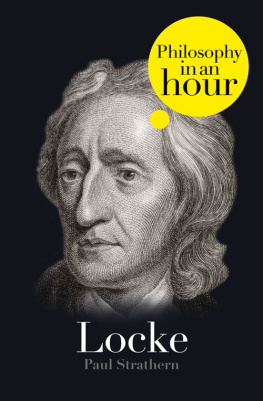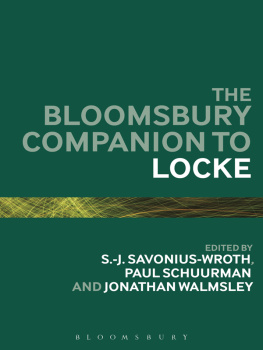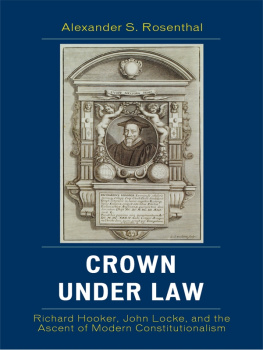
Table of Contents
blackwell great minds
edited by Steven Nadler
The Blackwell Great Minds series gives readers a strong sense of the fundamental views of the great western thinkers and captures the relevance of these figures to the way we think and live today.
Kant by Allen W. Wood
Augustine by Gareth B. Matthews
Descartes by Andr Gombay
Sartre by Katherine J. Morris
CharlesDarwin by Michael Ruse
Schopenhauer by Robert Wicks
Shakespeare's Ideas by David Bevington
Camus by David Sherman
Kierkegaard by M. Jamie Ferreira
Mill by Wendy Donner and Richard Fumerton
Socrates by George H. Rudebusch
Maimonides by T.M. Rudavsky
Wittgenstein by Hans Sluga
Locke by Samuel C. Rickless
This edition first published 2014
2014 Samuel C. Rickless
Registered Office
John Wiley & Sons Ltd, The Atrium, Southern Gate, Chichester, West Sussex, PO19 8SQ, UK
Editorial Offices
350 Main Street, Malden, MA 02148-5020, USA
9600 Garsington Road, Oxford, OX4 2DQ, UK
The Atrium, Southern Gate, Chichester, West Sussex, PO19 8SQ, UK
For details of our global editorial offices, for customer services, and for information about how to apply for permission to reuse the copyright material in this book please see our website at www.wiley.com/wiley-blackwell.
The right of Samuel C. Rickless to be identified as the author of this work has been asserted in accordance with the UK Copyright, Designs and Patents Act 1988.
All rights reserved. No part of this publication may be reproduced, stored in a retrieval system, or transmitted, in any form or by any means, electronic, mechanical, photocopying, recording or otherwise, except as permitted by the UK Copyright, Designs and Patents Act 1988, without the prior permission of the publisher.
Wiley also publishes its books in a variety of electronic formats. Some content that appears in print may not be available in electronic books.
Designations used by companies to distinguish their products are often claimed as trademarks. All brand names and product names used in this book are trade names, service marks, trademarks or registered trademarks of their respective owners. The publisher is not associated with any product or vendor mentioned in this book.
Limit of Liability/Disclaimer of Warranty: While the publisher and author have used their best efforts in preparing this book, they make no representations or warranties with respect to the accuracy or completeness of the contents of this book and specifically disclaim any implied warranties of merchantability or fitness for a particular purpose. It is sold on the understanding that the publisher is not engaged in rendering professional services and neither the publisher nor the author shall be liable for damages arising herefrom. If professional advice or other expert assistance is required, the services of a competent professional should be sought.
Library of Congress Cataloging-in-Publication Data applied for
Hardback ISBN: 978-1-4051-8935-4
Paperback ISBN: 978-1-4051-8936-1
A catalogue record for this book is available from the British Library.
Cover image: Engraving of John Locke. Bettmann/Corbis.
Cover design by Cyan Design.
To my mother,
Regina Sarfaty Rickless
preface
Writing a book on the most important themes of John Locke's entire philosophical output is a singular challenge. One of the reasons he was such a great philosopher is that he was remarkably knowledgeable and instinctively curious, with a penchant for clarity and systematicity. His work covers topics in the philosophy of mind, metaphysics, philosophy of language, epistemology, moral philosophy, and political philosophy. I have done my very best to provide a concise, clear, and, I hope, relatively accessible conspectus of Locke's contributions in these areas. I would have liked to have been able to discuss more of Locke's theological views, as well as the details of his investigations into natural philosophy (science). But I had to leave these matters to one side for reasons of space. Readers who are interested in these topics will learn a great deal from the work of Victor Nuovo (on the first) and Peter Anstey (on the second), among others.
I have many people to thank for helping me to bring this book to fruition. First and foremost, I am grateful to Steven Nadler and the editorial staff at Wiley Blackwell for granting me the commission, and I thank Gideon Yaffe for encouraging me to take it. Although I had spent some years thinking about various aspects of Locke's philosophy, I had certainly not thought through his views on all the matters covered in the pages to follow. As I wrote, I tried out chapters (or parts thereof) on two audiences, for whose patience and constructive comments I am very grateful: the Roger Woolhouse Memorial Conference at the University of York in JuneJuly 2012, and the History of Philosophy Roundtable at UCSD with special thanks to Donald Baxter, Martha Bolton, Justin Broackes, Lisa Downing, Paul Lodge, Antonia LoLordo, Peter Millican, Lex Newman, Pauline Phemister, Gonzalo Rodriguez-Pereyra, Timothy Stanton, and Tom Stoneham. For their supremely clear-eyed and helpful contributions on a variety of matters Lockean, whether in conversation or on paper or both, I would also like to thank Peter Anstey, Margaret Atherton, Vere Chappell, Michael Jacovides, Nick Jolley, Jessica Gordon-Roth, Ruth Mattern, Ed McCann, David Owen, John Simmons, Galen Strawson, Matthew Stuart, Udo Thiel, Bill Uzgalis, Jeremy Waldron, Ken Winkler, Roger Woolhouse, and Gideon Yaffe: it really does take a village. For supporting my research with the help of a grant that enabled me to purchase most of Locke's correspondence, I would like to thank the UCSD Dean of Arts and Humanities, Seth Lerer, from whom I also learned a great deal about Locke's philosophy of education and his appreciation for, and translation of, Aesop's fables.
For their moral support and willingness to help me parcel out my research and teaching time in the most efficient way possible, I am very grateful to my colleagues David Brink and Don Rutherford, both of whom sacrificed a great deal as (consecutive) department chairs in order to make the UCSD philosophy department the vibrant and stimulating intellectual community that it is. The community of historians of philosophy at UCSD, including my colleagues David and Don, Eric Watkins, Clinton Tolley, Michael Hardimon, and Monte Johnson, and my doctoral student, Nate Rockwood, made excellent suggestions and provided useful objections that contributed to improvements in the book. More than anything, I thank my lucky stars for the fact that my wife and colleague, Dana Kay Nelkin, and our two wonderful children, Sophie and Alice, make it possible for me to live and work in an environment pervaded by intellectual honesty, boundless curiosity, and untrammeled love.
My first ever publication (in 1997) was on Locke's distinction between primary and secondary qualities. When I received the offprints, I immediately sent one to my mother. When I next visited her, she had found a special stand for it and had given it a prominent place in her study. Every day of my life she has been proud of me and given me unconditional love and support. So this book is dedicated to you, Mom: wife, mother, and opera singer extraordinaire. Thanks for everything, but especially for the banana cream pie.
Next page











